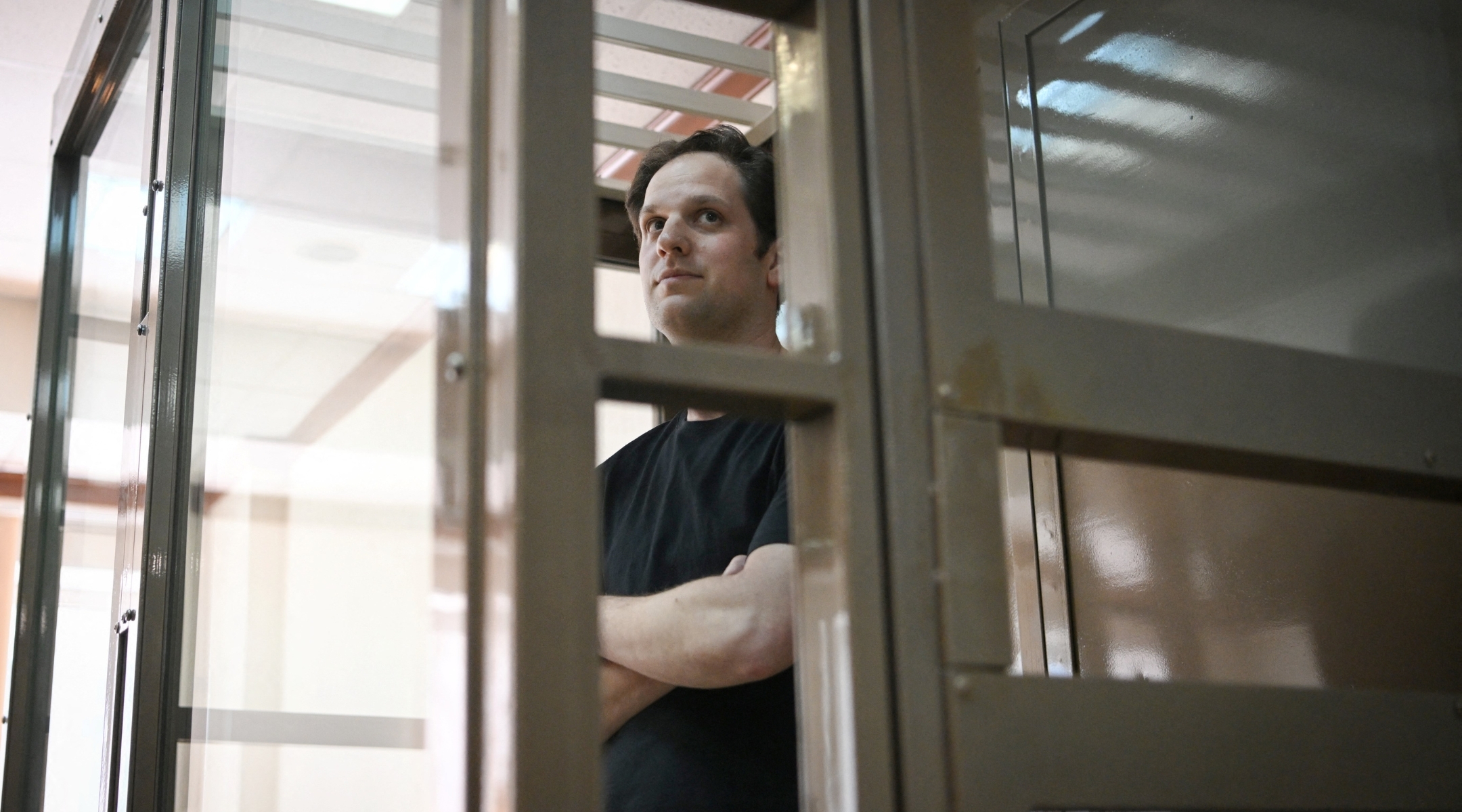Evan Gershkovich, American Jewish journalist jailed in Russia, is freed in prisoner exchange
Gershkovich was freed as part of a massive, 26-person prisoner exchange that included several prominent people jailed by Russia

US journalist Evan Gershkovich stands inside a defendants’ cage at Moscow City Court on June 22, 2023. (Photo by NATALIA KOLESNIKOVA/AFP via Getty Images)
(JTA) — Evan Gershkovich, the American Jewish Wall Street Journal reporter who has been held in Russian prison for more than a year, is now free, the White House announced Thursday.
Gershkovich, 32, was freed as part of a massive, 24-person prisoner exchange that included several prominent people jailed by Russia. The list of those released includes Russian-British activist and journalist Kara-Murza, who is also Jewish, as well as former U.S. Marine Paul Whelan. The secretive swap occurred in Ankara, Turkey, between Russia and the United States, Germany, Poland, Slovenia and Norway.
“Some of these women and men have been unjustly held for years,” President Joe Biden said in a statement Thursday. “All have endured unimaginable suffering and uncertainty. Today, their agony is over.”
He added, “I will not stop working until every American wrongfully detained or held hostage around the world is reunited with their family.”
Evan Gershkovich, Alsu Kurmasheva, Paul Whelan. Free. Amazing. #IStandWithEvan pic.twitter.com/mGtNjTwedB
— Paul Beckett (@paulwsj) August 1, 2024
Gershkovich was arrested in Yekaterinburg on charges of espionage in March 2023 while on a reporting trip — charges that he, the United States government, and the Wall Street journal vehemently deny. He spent up to 23 hours a day in solitary confinement at times, and had recently been sentenced to 16 years in a maximum security Russian prison. His mother, Ella Milman, played an active role in securing his freedom, at one point submitting herself to more than four hours of interrogation by Russian authorities, according to the Wall Street Journal.
In prison, the paper reported, Gershkovich worked on a book. In his release forms, addressed to Russian President Vladimir Putin, he asked Putin for a sit-down interview.
The swap Thursday is the largest one since the Cold War. That era saw a number of prominent prisoner exchanges, including a swap that freed the Jewish Soviet dissident Natan Sharansky, who was a face of the movement to free Soviet Jewry and, over the past year-plus, has been an active advocate for Gershkovich’s release.
Gershkovich’s case, too, has garnered the support of the Jewish community worldwide. Activists sent letters to him over Rosh Hashanah last year and left an empty seat for him at the Passover seder, both echoes of the campaign to free Soviet Jews. Gershkovich is the son of Jewish emigrants from the Soviet Union. Upon news of his release, the Orthodox Union tweeted “Baruch matir assurim,” the Jewish blessing over the release of captives.
“Since the arrest of Evan Gershkovich in March 2023, Jewish Federations have been actively in advocating for his release,” the Jewish Federations of North America wrote in a statement Thursday. “Today, Federations are overjoyed and relieved at the news of Evan’s release, along with the release of Paul Whalen and other political prisoners.”
The statement added, “Evan, our community has been incomplete without you. Welcome home.”













